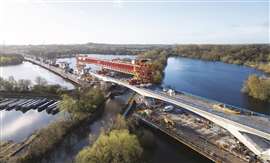UK heading for reset on infrastructure delivery amid further HS2 delay
18 June 2025

The UK government is preparing to release two reports on the high-speed railway that will signal a reset on how major infrastructure projects are delivered, as it was reported that the project will be delayed beyond 2033.
Construction of HS2 started in 2019 and the first phase, running from London to Birmingham, was originally intended to open by 2026 at a cost of £33 billion (€38.6 billion).
But the cost ballooned, at the same time that delays mounted. By 2020, an independent estimate put the cost of the all phases of HS2 at £106 billion (€124 billion).
In October 2023, former Prime Minister Rishi Sunak announced that the northern leg of HS2, running to Manchester and Leeds, would be scrapped, generating a £36 billion (€42.1 billion) saving.
The cost of the remaining section of HS2 still under construction has seen its budget rise to £37 billion (€43.3 billion) between 2012 and the general election last year.
The opening of HS2 is now expected to be delayed beyond 2033, according to the BBC.
Transport Secretary Heidi Alexander is expected to tell Parliament today (18 June) that she will release two reports into HS2 to “draw a line in the sand” over the project.
The first, from former Crossrail chief executive James Stewart, was commissioned last year to “investigate the oversight of major transport infrastructure projects”.
The second, by HS2 chief executive Mark Wild, will assess the construction of the London to Birmingham phase of the project.
STAY CONNECTED



Receive the information you need when you need it through our world-leading magazines, newsletters and daily briefings.
CONNECT WITH THE TEAM









